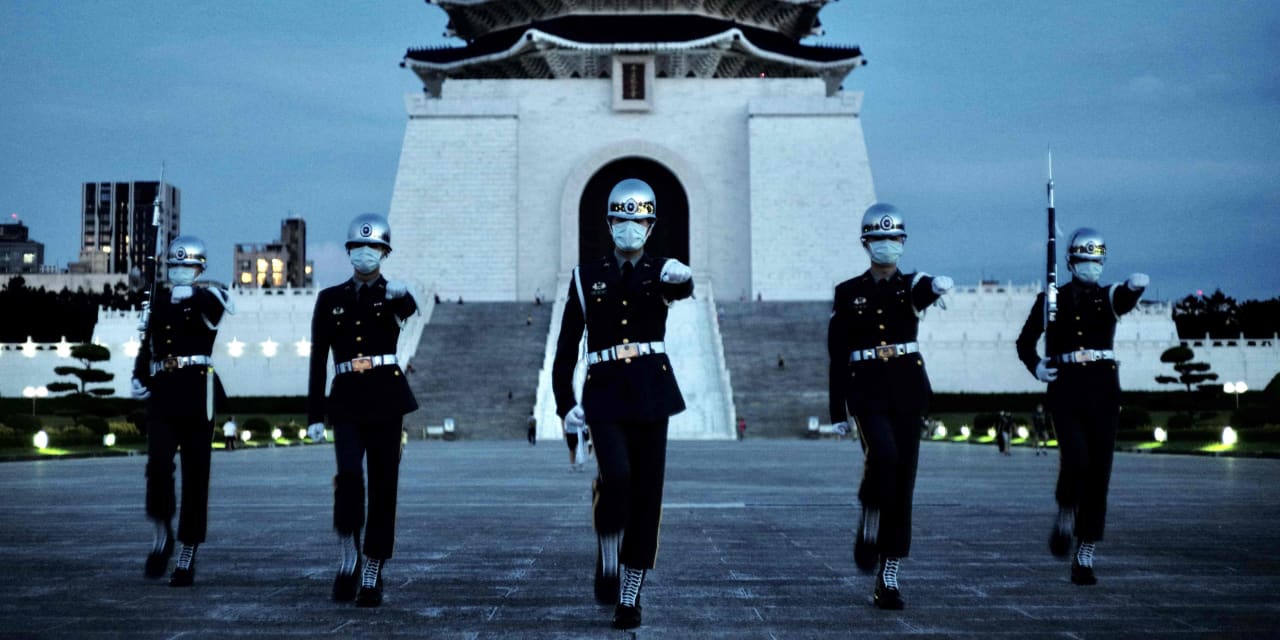This Saturday, Taiwan will head to the polls, in elections that will be closely watched by investors, due to the self-governing territory’s outsized role in the global economy as the biggest semiconductor manufacturer in the world.
For voters, the choice between the three candidates – representing the center-left Democratic Progressive Party (DPP), the center right Kuomintang (KMT), and the centrist Taiwan People’s Party (TPP) – will largely come down to the various parties’ approaches to improving economic conditions for Taiwan’s population of 23.5 million people.
Yet for investors, the fundamental dividing line between Taiwan’s political parties lies in their differing stances to the island’s closest neighbor, China, which still considers Taiwan to be a renegade province.
The Shanghai Composite
CN:SHCOMP,
for a variety of reasons including fears over China’s policy toward Taiwan, has declined by 7% over the last 12 months, a period in which the S&P 500
SPX
has gained 21%. Taiwan’s Taiex
TW:Y9999,
by contrast, has gained 22%.
For U.S.-based investors, the iShares MSCI China ETF
MCHI
has dropped 28% over the last 52 weeks, while the iShares MSCI Taiwan ETF
EWT
has gained 1%.
From this perspective, the choice between the two parties that have maintained a duopoly over Taiwan’s government since its first ever democratic elections in 1996 represents a choice between the pro-China KMT and the more U.S. aligned DPP. The third-party TPP has pitched its position as a middle ground between those offered by the KMT and DPP.
Tai Hui, APAC chief market strategist at J.P. Morgan Asset Management, explained to MarketWatch that Taiwan’s upcoming elections carry a heightened geopolitical importance due to the influence the vote will have on U.S.-China relations in the medium to long term.
The Economist’s average of polls suggest the ruling center-left DPP will beat its main rival, the center-right KMT to win control of Taiwan for the third time in a row, with a 36% to 31% advantage over the KMT, with the TPP on 24%.
Taiwan’s polls will close at 4 p.m. local time (3 a.m. Eastern) on Saturday with local media set to offer their predictions on the winner based on early counts of the vote.
A DPP victory would see current Vice President Lai Ching-te succeed incumbent President Tsai Ing-wen, who is set to step down this May having led Taiwan’s government since 2016.
Oldfield Partners emerging markets analyst Charles Sunnucks told MarketWatch that investors would likely prefer to see KMT candidate Hou Yu-ih win the elections on Saturday as he explained that the pro-China candidate’s victory would likely see an easing of tensions with China.
In election debates, KMT vice-presidential candidate Jaw Shaw-kong has specifically pitched his party’s pro-China policies as key to Taiwan’s economic development.
In a research note, Wells Fargo economist Brendan McKenna explained that a DPP victory would likely lead to a worsening of relations and see stepping up of Chinese war games in the Taiwan Strait. A KMT victory would, by contrast, likely see a scaling back of Chinese incursions and opening up of Taiwanese engagement with the Chinese Communist Party.
McKenna noted that while China is unlikely to launch an invasion in the immediate term, a potential misstep in China’s wargames could lead to a significant heightening of tensions which could, in turn, lead to all out war.
Chinese wargames also threaten to worsen relations between China and the U.S., in heightening potential for U.S. retaliation in the form of increased trade restrictions.
Taiwan plays a vital role in global trading, producing 68% of the world’s semiconductors, including 90% of the most cutting edge computer chips that are used in AI and quantum computing, according to the Council on Foreign Relations.
Hsinchu headquartered Taiwan Semiconductor Manufacturing Company
2330
is based there and produces its most advanced microchips in Taiwan. The Taiwan Strait, which sits between the south-east coast of China and the west coast of the island of Taiwan, also plays a core part in global trade as one of the busiest shipping lanes in the world.
A former Trump administration official, Robert O’Brien, even said the U.S. would attack TSMC’s chip manufacturing facilities in Taiwan, to block China from accessing the company’s factories, in the event of an invasion.
Either way, Sunnucks said that Taiwan’s elections are unlikely to be a game changer in the immediate term as he argued China will likely seek to avoid outright war with Taiwan due to its own reliance on Taiwanese semiconductors.
He instead argued that markets will likely react positively, whatever the result, due to the increased levels of certainty provided by a definitive electoral win, as he noted Taiwan’s close links to major developed markets, such as the U.S., via companies including iPhone maker Foxconn.
Yet in the view of XTB senior market analyst Hani Abuagla, the elections are also unlikely to improve tensions between China and Taiwan significantly either way – even in the case of a KMT win – with all parties in the running currently opposed to unification with China. The Chinese government, meanwhile, sees unification as inevitable.
“Regardless of who wins the elections, a significant improvement in relations with China is unlikely,” Abuagla said.







